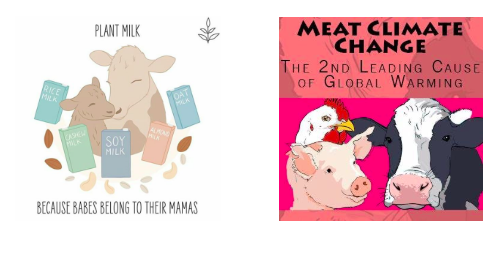Diva Sinha, BA Religions
The increasing levels of global warming have been hailed as one of the greatest threats to humanity and the environment. For years, industrialization and urbanization are believed to be the culprits of climate change. While this is true, food production has been a very overlooked part when it comes to narrowing down the significant factors responsible for climate change.
Recent reports and studies have concluded that there is a link between the production of meat, dairy, consumption of animal-based foods and climate change.
The production of pork, beef, chicken, and milk is one of the key factors causing environmental pollution, deforestation, and rising levels of methane gases — all of which contribute to an increase in global warming.
In order to be sustainable and conscious individuals of the modern world, it is essential to understand how the food we eat daily is causing a detrimental effect on our climate.
So how does meat affect the climate?
This is the most common question that people ask and it is a crucial one. The consumption of certain foods and their adverse impact on climate change may sound absurd at first, but it is a genuine statement backed up by facts and research.
The animal agricultural industry uses factory farming as its primary method of rearing animals for meat. Factory farms require a vast expanse of land space to keep several thousands of pigs, chickens, turkeys, lambs, and dairy cows who are routinely killed using brutal methods. To house the animals in factory farms, acres of forested land is cleared, this is one of the leading causes of deforestation and raising warming levels. Livestock produces methane in substantial quantities through the digestion of food. Nitrous oxide, another greenhouse gas more potent than carbon dioxide, is produced from cow manure which contains significantly higher levels of nitrous oxide than most animals.
The wastes produced from the animals are also responsible for the pollution of soil, water, and air. Nitrogen and ammonia are
The nature of meat production is highly energy intensive as it requires several stages. From keeping the animals fed, slaughtered, the processing, transportation, and storage of the meat — all of these activities require intense energy and extensive use of water. Loss of biodiversity, increasing greenhouse gases, damage to forests, overuse of fossil fuels, excess wastes and water pollution are all major problems associated with the use of
Why should we reduce the consumption of meat and dairy?
Reduction of meat and dairy products is one of the significant ways to fight climate change. Studies conducted by researchers have shown that an individual who consumes animal-based products has a higher carbon footprint than someone who consumes vegan foods. Following a vegan diet can help lower the levels of greenhouse gas emissions significantly.
Plant-based milk such as almond, oat, soy, cashew, hemp, and rice require lesser amounts of water than cow’s milk and have a smaller carbon footprint than the latter. In a research study conducted by Martin Heller of the University of Michigan in 2014, the findings revealed almond and soy milk to have 174 and 200 grams per C02 of carbon footprint while the cow’s milk had 400 grams per C02.
The reduction of meat consumption would lead to less supply, which would automatically mean that fewer areas of forested land would be cleared to create space for farming. Less use of meat and dairy products will lead to the restoration of forests, cause less pollution and will reduce the
Reducing animal products will also help millions of animals who suffer severe torture and atrocities at the hands of humans. Animals are sentient beings like humans who form friendships, relationships, have families, can think and feel pain. By choosing to leave animal flesh off the table, we can help reduce the devastating impacts on the climate and environment, spare innocent beings from unnecessary suffering and live a much healthier life.
Instagram @Februdairy ; Twitter @Meatclimate
